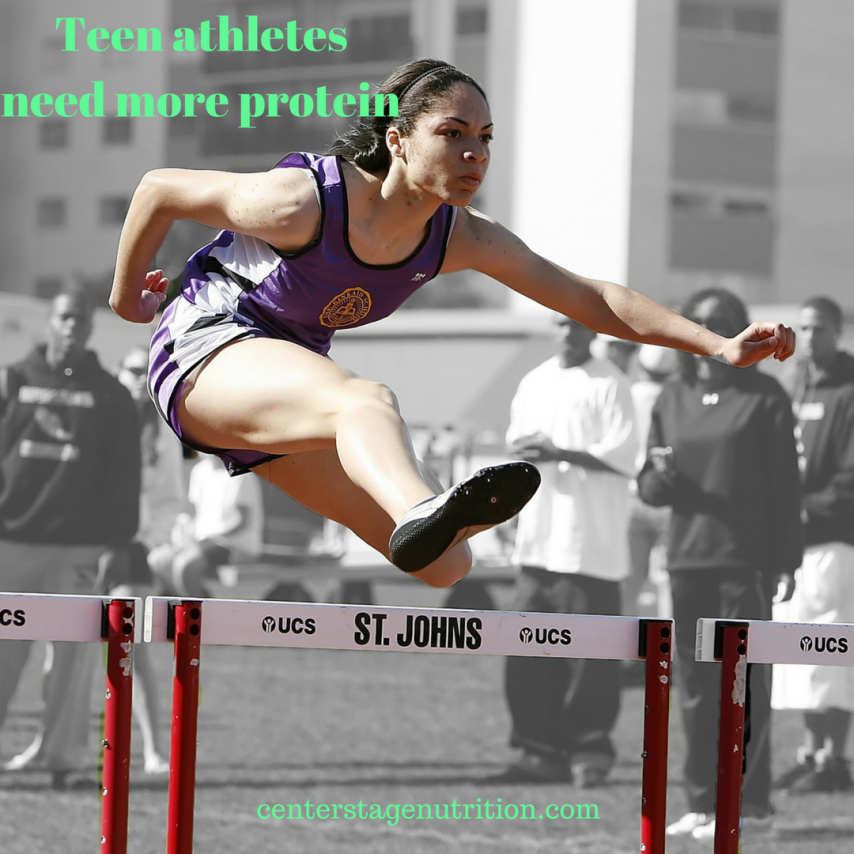
I wasn’t a school athlete. I was one of those ‘too cool for school (sports)’ theatre kids who never really understood the hype of a home football game, or lacrosse game if your town is anything like mine.

Yeah, I’m not kidding, we have a lacrosse team. And before you ask, I have no idea what lacrosse really is except tall sticks with nets on top that’s KIND of like Quidditch but there are no broomsticks involved. I did like running, but I wasn’t on cross country, and I didn’t start lifting until my senior year of high school.
So it might not be a surprise when I say that my knowledge of sports nutrition comes more from an angle as an adult who’s trying to fuel her workouts, who looked into the difference between teen athlete nutrition and adult athlete nutrition. What do we know already?
- Teens are growing rapidly in a way like when they were babies, which burns calories
- Moving around burns calories
- Teens like to eat (as they should, food is awesome)
So what does this mean?
Teen athletes need a lot of calories, especially…(drum roll please) PROTEIN!
Yes, protein, the magical macronutrient we’ve covered in the past. Let’s look more in depth on how to fuel your teen athlete:
how much protein does my teen need?
Eatright.org currently recommends .5-.8g/kg of your teen’s bodyweight. Since they exercise more than teens who are just sedentary, try to aim more for .8-1g/kg body weight.
Teen athletes are still growing, so we want to make sure they’re not just getting enough protein for their sport but for their growth as well! Protein doesn’t just help build muscles, but it makes red blood cells, white blood cells, and is used for hormones (which we know teens have a lot of!) and enzymes.

Lots of people tell us that the US is protein-obsessed and takes in too much. Is that true?
Yes and no. So, yes, there is an idea that we eat way too much protein which can have negative health effects like kidney strain. But what we need to look at is the quantity and quality of the protein you’re getting.
In a vegan diet, protein is coming from soy meat products, tofu, seitan, tempeh, beans, lentils, nuts.
In a standard American diet (not Mediterranean or DASH focused), protein sources are often large servings of red meat, processed meat, or restaurant style portions of animal products. Not just meat, but cheese or dairy.
If your teen is vegan and paying attention to their protein, they’ll have no issues getting their protein amounts in daily. If your teen is not vegan, it’s better to get their protein from sources like chicken, fish, eggs, nut butters, and dairy rather than red meat.
Another source of worry when it comes to protein intake is supplements.
While teens can use protein shakes for various reasons- building muscle (“bulking”), losing weight (“cutting”), 1 scoop of vegan protein powder can offer about 20g of protein.
So while these can be really helpful when it comes to athletes, it still should be treated like other protein sources- rather than something on it’s own. Most protein powders, especially vegan powders, are safe for consumption. One place I like to go is truenutition.com and make a custom blend of soy, rice, hemp, pumpkin protein. Chocolate flavor of course!

Fueling your athlete’s practices and games are important not just for performance but for growth and muscle repair.
Notice how eatright’s source mentions around 3,000 calories? Don’t let that number scare you. Remember, calories are not morality currency where the more you take in, the less humane you are. They’re just the way your body takes in energy to use for the things you love to do.
And it’s important you let your teen know their appetite is normal.
If your teen is an athlete, you do want to make sure these calories are full of fruits, veggies, complex carbs, and our friend protein.
So let’s say your teen is 160lb. How much protein do they need?
160/2.2= 72kg. If they’re an athlete, let’s say they’re aiming for .9g, so:
72/.9= 80 grams of protein a day at least.
There has been a new study in sports science where they upped the protein requirement for muscle building, which I’ll write more about soon, but wanted to share it here for my fellow study nerds!
What do you think? Share some of your favorite after-practice snacks below!